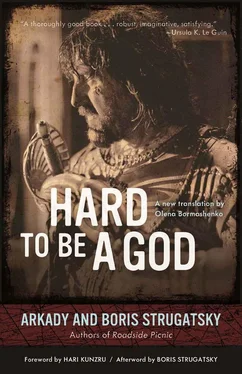“And how is he with you?”
“He isn’t anything. He tolerates me. But it’s different with you.”
They were quiet.
“Anka,” Pashka said. “Do you remember the anisotropic highway?”
Anka frowned. “What highway?”
“Anisotropic. The one with the do-not-enter sign. Remember, the three of us went there?”
“I remember. It was Anton who said that it was anisotropic.”
“That was the time Anton went through the sign, and when he came back, he said that he found a blown-up bridge and the skeleton of a fascist chained to a machine gun.”
“I don’t remember that,” said Anka. “So what?”
“I often think about that highway nowadays,” said Pashka. “Like there’s some connection. The highway was anisotropic, like history. You weren’t supposed to go back. But he did go back. And stumbled on a chained skeleton.”
“I don’t understand you. What does the chained skeleton have to do with it?”
“I don’t know,” Pashka admitted. “It just makes sense to me.”
Anka said, “Don’t let him think too much. You should always talk to him about something. Any kind of nonsense. So he’ll argue with you.”
Pashka sighed. “I know that. Except what does he care about my nonsense? He’ll listen, smile, and say, ‘Why don’t you just sit here, Pasha? I’ll go wander.’ And off he goes. And I sit there. At first, I was discreetly following him, like an idiot, but now I just sit and wait. But if you—”
Anka suddenly stood up. Pashka looked around and also stood up. Anka watched, holding her breath, as Anton walked toward them across the clearing—huge, broad, with a pale, untanned face. He hadn’t changed much; he had always been a bit gloomy.
She walked toward him.
“Anka,” he said tenderly. “Anka, my friend…”
He stretched his huge hands toward her. She timidly reached for him and immediately shrank back. On his fingers…
But it wasn’t blood—only strawberry juice.
Afterword
by Boris Strugatsky
Can this novel be considered a work about a “bright future”? To some extent, definitely. But only to a very small extent.
As a matter of fact, while my brother and I worked on it, it underwent substantial changes. It began in the planning stages as a fun adventure story in the spirit of The Three Musketeers, as indicated in this excerpt from one of my brother’s letters:
01/02/62—AS: …I’m sorry, but I inserted Seventh Heaven [into the Detgiz (an acronym for the State Publishing House for Children’s Literature) plan for 1964], the novel about our spy on the feudal alien planet with two kinds of intelligent creatures. I’ve sketched out a plan, it’s going to be an exciting story, might be very funny, full of jokes and adventures, with pirates, conquistadores and so on, maybe even the Inquisition….
The actual idea of “our spy on an alien planet” had emerged back when we were writing Escape Attempt. That book briefly mentions a certain Benny Durov, who was exactly such a spy on the planet Tagora. The idea flashed across our minds; we didn’t have the time for it, but it didn’t vanish without a trace. Now it was its turn, although we still didn’t fully understand all the opportunities and perspectives that would arise here.
The title Seventh Heaven had been taken away from an unwritten novel about wizards that eventually became Monday Starts on Saturday. Why it was given to a similarly unwritten novel about “our spy” becomes clear from Arkady’s letter. I can’t resist reproducing a long excerpt from it here, so that the reader can see through concrete example how much the authors’ initial plans and outlines can differ from an idea’s final realization.
Somewhere there exists a planet, a precise replica of Earth, possibly with minor deviations, currently in the era immediately before the great geographical discoveries. Absolutism, merry drunk musketeers, a cardinal, a king, rebellious princes, the Inquisition, sailors’ taverns, galleons and frigates, beauties, rope ladders, serenades, etc. And this is the country (a cross between France and Spain, or Russia and Spain) where our earthmen, long since absolute communists, “plant” someone—a young, strapping, good-looking guy with a huge fist, an excellent fencer, etc. Actually, not all earthmen plant him there, but, say, the Moscow Historical Society. One day, they approach the cardinal and tell him, “Here’s how it is: you wouldn’t understand, but we’re leaving this kid here; you’ll protect him from any intrigues; here’s a sack of gold, and if anything happens to him, we’ll skin you alive.” The cardinal agrees, the boys leave a broadcasting satellite by the planet, the guy wears a gold circlet around his head, as is the local fashion—except with a camera built into it instead of a diamond, which communicates with the satellite, which then in turn communicates pictures of the society to Earth. The guy is left alone on the planet, rents an apartment from Monsieur Bonacieux, and occupies himself in sauntering around the city, milling about the noblemen’s anterooms, drinking in pubs, sword-fighting (but he never kills anyone, he even becomes famous for it), chasing girls, etc. This part would be very well written, fun, and amusing. When he climbs up the rope ladders, he modestly covers the lens with a plumed hat.
Then the era of geographical discoveries begins. The local Columbus returns and reports that he discovered America, a country as beautiful as Seventh Heaven, but there’s no way to stay there: he was beset by beasts unseen on this side of the ocean. Then the cardinal summons our historian, and tells him, help us, you are capable of a lot, let’s avoid unnecessary victims. The rest is clear. He calls for help from Earth—a high-powered tank and ten of his buddies with blasters, assigns a rendezvous with them on the other shore, and sails there on the galleons with the soldiers. They arrive, war begins, and then it’s discovered that these animals are also intelligent creatures. The historians are humiliated, called up to the World Council and given a good dressing down for their mischief.
This can be written in a really fun and interesting way, like The Three Musketeers, only with medieval piss and filth—how women smell there, how the wine is full of dead flies. And there would be the implicit idea that a communist who found himself in such an environment would slowly but surely become a petty bourgeois, although for the reader he would remain a sweet and kind kid.
That’s almost it, isn’t it? But at the same time it’s not quite it—and in a certain sense it’s definitely not it. We used to call these kinds of plans “sturdy substantial skeletons.” The existence of such a skeleton was a necessary (although not sufficient) condition for beginning real work. At least in those times. Later, another extremely important condition appeared: we absolutely had to know what would “soothe our souls”—what would be the ending of the planned work, the final landmark in the direction of which we were supposed to be dragging the plotline. But at the beginning of the 1960s, we still didn’t understand how important that was, and therefore we would often take a risk and be forced to change the entire plot along the way. Which is exactly what happened with Seventh Heaven.
The “sturdy substantial skeleton” of the novel Arkady suggested was without a doubt good and promised us some wonderful work. But apparently, even at an early stage of the discussions, some differences in approach between the coauthors appeared; we hadn’t even sat down at the table to begin the work when there was already a debate, the details of which I certainly do not remember, but its general course can be traced through other excerpts from Arkady’s letters. (My own letters through the year 1963 were lost—alas!—irretrievably.)
Читать дальше












